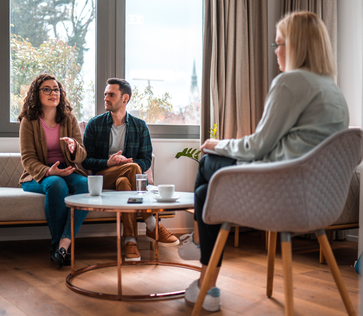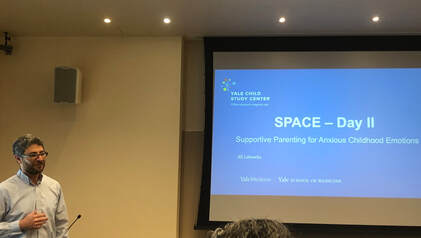|
If your child or teen is feeling worried, it’s SO tempting to immediately GIVE them information that will help them feel better! But if your child is a chronic worrier who often gets stuck, this doesn't usually help much over the long run. Instead of explaining all the reasons why they shouldn't feel nervous… what if you could help your child come up with the information themselves? How can we do this? The key is in using Socratic Questioning! Check out this blog post to learn how to use this important CBT tool to help your child or teen cope with anxiety. If your child or teen is struggling with anxiety, and you’ve been researching a bit about what might be helpful - you’ve probably heard about Cognitive Behavioral Therapy (CBT).  CBT is an evidence-based treatment that helps children and adults learn to cope with anxiety so that they can get back to living their normal, everyday lives. “Evidence-based” means that research studies show that for individuals who complete this treatment, a significant reduction is seen in anxiety symptoms. To understand how CBT tools work - let’s first look at what MAINTAINS and grows anxiety over time. One of the biggest culprits is Avoidance. When anxiety is triggered, many children respond with a desire to avoid the situation. On the surface - it makes total sense! Nobody likes feeling anxious or uncomfortable, so avoidance seems like an easy quick-fix (spoiler alert - it just makes anxiety worse over the long run!). Here are some examples of avoidance:
Seeking Reassurance: A Common Anxiety Symptom in Kids and TeensThe other key factor that maintains anxiety over time is excessive reassurance-seeking. When your child starts to feel worried, it makes sense that they might turn to you and other trusted adults to reassure them. They might ask you, “Everything is going to be ok, right?” This sounds healthy, but when done excessively, it can lead to higher levels of anxiety over the long run. If your child is good to go with a quick one-time reassurance, that’s wonderful! BUT, usually when children struggle with chronic anxiety - they can’t quite get enough reassurance. They’ll often ask more and more questions, and sometimes get very upset when they don’t get the information they feel they need. Here’s what that can look like:
If these examples sound familiar to you, I can imagine how frustrated and overwhelmed you feel at times. As parents, we don’t want our children to feel upset - we’re hard-wired to protect them! So it is very tempting to quickly GIVE our kids the information they’re asking for when they’re feeling nervous. Example - “Ok, let me check with the teacher to make sure you’re studying the right thing, and no worries, of course you won’t black out! That’s never happened to you, so I’m sure it won’t happen this time.” INSTEAD of providing repeated reassurance and responding with the information your child is asking for… What if you could help your child come up with the information themselves?  By using a key CBT tool - Socratic Questioning - you can do just that. When children come up with information on their own that will help them challenge their worry thoughts, it is so powerful in helping them cope with anxiety. When trying to help your child change their thinking about an upcoming feared situation - discussing examples and information that your child has come up with (rather than just passively listening to your explanation) - will be much more effective. Socratic questioning is used by CBT psychologists in therapy sessions everyday because it is an effective tool that helps individuals begin to challenge and change their negative thoughts. Using Socratic Questioning to Respond to your Child’s WorriesSo, what exactly is Socratic Questioning? It is the process of using a series of gentle, open-ended questions to help someone reflect on specific pieces of information (e.g., past experiences) that can lead them to challenge and change their views on a situation. How do you apply this key CBT skill to help your child cope with anxiety? Let’s dive into a few examples that model providing reassurance vs. using socratic questioning.
What if Socratic Questioning Makes your Anxious Child Feel Frustrated? While waiting for your child to respond, it’s possible that they’ll come up empty-handed and not be able to identify key past experiences or other objective data that would help them to change their perspective. Do not panic! Give your child or teen a bit of help, but only as much as needed to help them reconsider their perspective. The idea here is something called scaffolding - and can sound like this: Situation (Follow-up from previous example): Parent: So how did your recent presentations go? Child/Teen: I don’t know - I don’t remember - I think terribly!! (frustrated tone) Parent: Yeah, I hear ya. I get why you’re feeling frustrated right now (Validation). I remember that last month in Science, you did a presentation… I think it was the solar system? (Scaffolding - providing a little more assistance to help your child generate objective information to challenge their negative belief). Child/Teen: Oh right, I do kinda remember that. Parent: Yeah, that was a tough one. I remember you felt very nervous. Child/Teen: I was so nervous! But we practiced a bunch, and then it actually went okay! With scaffolding, we’re still giving our kids an opportunity to independently identify pieces of information that will help them challenge their worry thoughts. This is an important skill because when anxiety shows up, your child will feel more confident to handle the situation on their own. Two Key Tips for Parents Using Socratic QuestioningThe key to using Socratic Questioning successfully with your anxious child or teen is to:
This takes practice, but I am cheering you on because I am confident that it will help your child or teen cope with anxiety and OCD. SPACE Therapy for Anxiety and OCD Teaching parents about how to use socratic questioning, and other key tools to support their child or teen in navigating anxiety and OCD challenges is something I LOVE to do. That’s why one of my areas of specialty in my Florida-based private practice is providing SPACE therapy to parents. Have you heard of SPACE (Supportive Parenting for Anxious Childhood Emotions)? It’s a science-backed therapy approach developed at Yale University that is a cutting-edge treatment for anxiety in youth. What's so cutting-edge about it? Research has shown when parents of children with anxiety learn specific skills about how to respond to their anxious child - their child’s anxiety gets better! It’s a ground-breaking treatment because without a child even stepping into the room with a therapist, parents are able to partner with a SPACE-trained therapist to help the child or teen overcome their challenges with anxiety and OCD. Interested in seeing the research on SPACE? Check out this NPR article and this peer-reviewed journal article.
Comments are closed.
|
Dr. Penela proudly provides evidence-based therapy services in English and Spanish. In-person appointments available in South Florida: Weston, Pembroke Pines, Miramar, Davie, Cooper City, Parkland, Hollywood, Fort Lauderdale, Plantation, and surrounding areas.
Tele-health sessions available to individuals residing in all 39 PSYPACT participating states, including Florida.
Tele-health sessions available to individuals residing in all 39 PSYPACT participating states, including Florida.
© 2020 - 2024 Wellness in Broward


